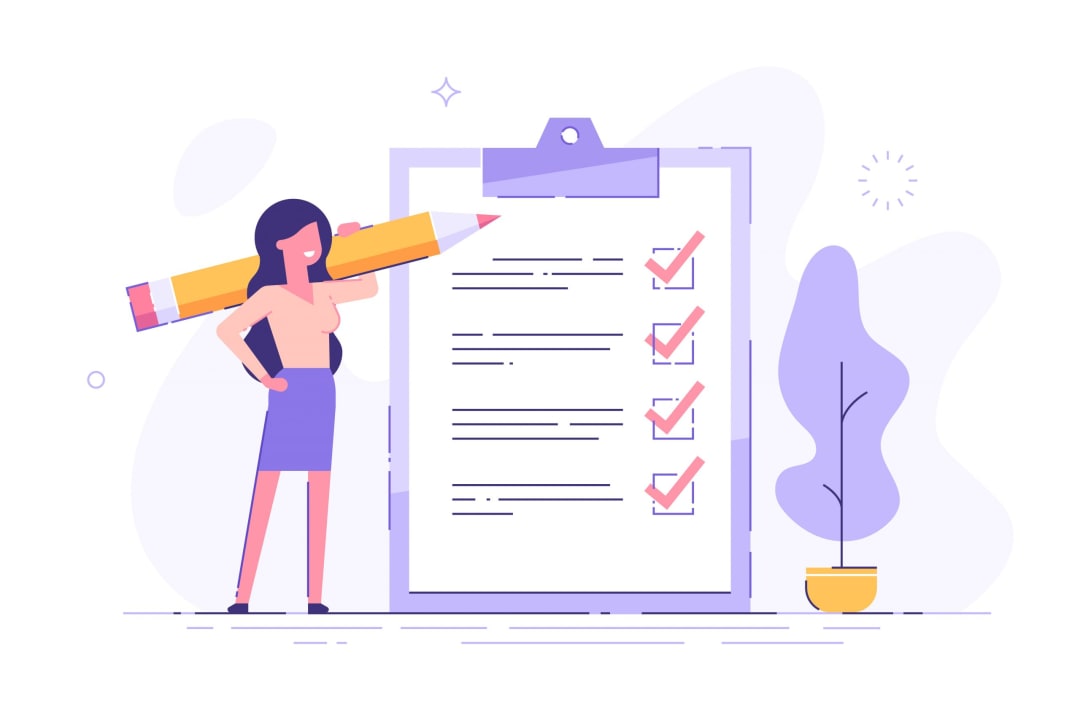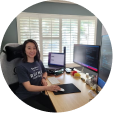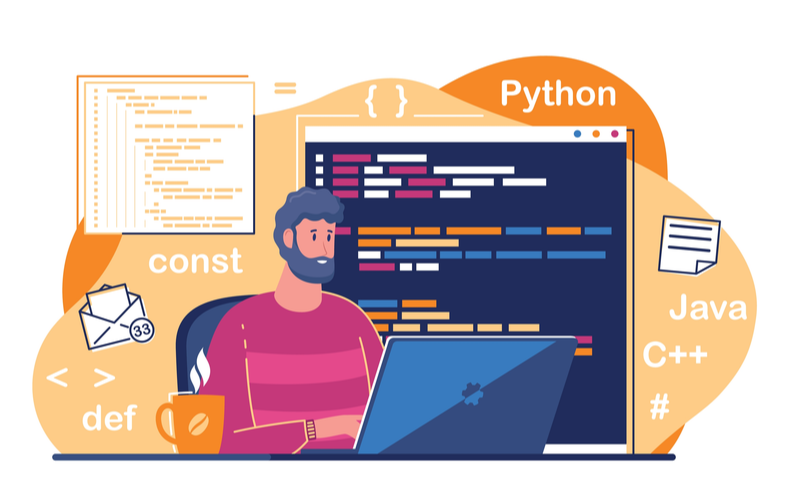Programming forms the basis of many day-to-day tech activities. From the app you use to order a pizza to the speech recognition that lets you dictate a text, many of the services we use every day have been created by people writing computer programs.
However, programming can appear to be an intimidating and impenetrable discipline, which raises the question: Is programming hard to learn? As any coder or programmer will tell you, learning the basics isn’t as daunting as it seems at first.
You have to learn a lot of new concepts, such as functions, loops, and variables. And then there are the languages. But how hard is programming, really? If you don’t have a college degree in a relevant discipline, can you get into it? The answer lies in finding the right resources to learn coding effectively. Read on to find out!
This blog post will guide you through everything you need to know about programming, from the foundational concepts to advanced techniques.
What Is Programming?
Programming refers to transforming computer instructions into a form that a machine can understand. Programs are written in a particular language designed to make it easy for humans to read and write. The code is then compiled and turned into an executable file, which the computer can run.
There are many different programming languages, but some of the most popular ones include Java, C++, PHP, and Python.


Become a Software Engineer. Land a Job or Your Money Back.
Code in the industry's most widely used programming languages. Test your knowledge through job-ready projects. Work 1:1 with an industry mentor. Land a job — or your money back.
What Makes Programming Difficult To Learn?
The major reason why programming is considered difficult to learn is primarily due to the complexity of the instructions that computers comprehend. You can’t give computers instructions in English or any other human language. Computer programmers have to learn different computer languages, depending on the type of project they’re working on.
For example, Java is considered the most popular programming language for mobile app development.
Some other things that make programming hard to learn are:
- An excessive number of complicated languages, There are dozens of popular programming languages, and new ones are created every day. The versatility makes it difficult to decide which language(s) to learn.
- Vocabulary. To write code, you need to understand the vocabulary of the programming language you’re using. This can be difficult if you don’t have a technical background or if you are not familiar with any foundation programming language like C.
- Lack of resources. There are many online resources for learning programming, but they’re not always easy to find or use. However, figuring out the best resource to learn programming makes it difficult for beginners to get started.
- Difficulty in understanding logic. To write code, you need to be able to understand and use logical statements. If you’re not used to working with complex abstract concepts, you might have trouble grasping certain ideas.
- Uncertainty. Programming has a reputation for being one of the most difficult disciplines to master. Considering how different it is from traditional forms of education, including college degrees in computer science, it’s not hard to see why some people have difficulty learning how to code.
How Long Does It Take To Learn Programming?
If you choose to start from scratch and pursue a bachelor’s degree in programming, it will most likely take about four years of full-time study to complete.
However, if you’re not looking for a degree and just want to start learning programming basics, you can get started in a few months by taking an online course.
These courses range in duration from three to six months and prepare you for different specialties. People with formal education in programming who want to enhance their skills in a certain specialty, such as hard coding or artificial intelligence, can also take programming bootcamps that are up to six to nine months long.
How To Get Started With Programming
Now that we know some of the reasons why programming can be hard to learn, let’s take a look at some of the things that can help you become a programmer.
Get To Know Other Software Engineering Students
Jason McGinty
Full-stack Systems Engineer at Technicity
Nadia Luna
Student at Springboard Software Engineering Bootcamp
Kristy Chu
Software Engineer at FloQast
Complete a Prep Course
You don’t a formal degree to work as a programmer, but your employer is going to test your knowledge and wants to know that you understand the fundamentals. The best way to get your head around these is with a short 4-6 week prep course in programming. It’s a great way of testing your knowledge and prepping for your career in the field – plus you’ll learn a lot about the industry and specialities you might like to pursue.
Build Your Foundation
Understanding the basics is always essential when it comes to learning something new. It’ll take some time, but persistence is the key, as you have to start with fundamentals before you can move on.
Some basic topics in programming are:
- Variable Declaration
- Basic Syntax
- Data Type and Structures
- Flow Control Structures (conditionals and loops)
- Functional Programming
- Object-Oriented Programming
- Debugging
- IDEs and Coding Environments
- Algorithms
Additionally, you should learn about different types of programming languages, such as:
- Procedural programming language. This type of language uses a set of procedures to solve problems. The code is written in a sequence, and the output is generated after the code is executed.
- Object-oriented programming language. This language uses objects to design applications. It helps you to create reusable code modules and makes it easy to extend the functionality of an application.
- Functional programming language. Such a language uses functions to solve problems. It doesn’t use any loop structures, and variables are not supposed to change values.
- Declarative programming language. This type of language is used for making queries. It’s mainly used in database systems. As this language contains a limited set of commands, it’s quite easy to learn.
Once you have a basic understanding of these concepts, you can start learning a specific programming language.
When you’re starting, it’s important to choose the right programming language. Starting with a programming language that you’re passionate about will make it easier for you to learn and give you the motivation needed to complete your learning tasks.
Utilize Free Resources
If you don’t want to spend money upfront on learning programming, you can opt for free resources instead, including online tutorials, forums, ebooks, and articles.
The main downside to using free resources is that you won’t have a personal instructor to help you out when you get stuck. However, most of the time, you can find help from fellow learners on online forums or social media groups.
Another option is to watch video tutorials on YouTube. This is a good way to pick up a specific topic quickly. For instance, Learncode.academy is a YouTube channel where the creator walks you through multiple topics, like jQuery, JavaScript, and more.
Springboard’s Beginner’s Guide to Front-End Programming is a free resource that teaches you how to create web pages. After finishing this free course, you’ll also have a solid foundation in CSS, HTML, and JavaScript.
You can also check out Khan Academy since the free website has a ton of short videos on different topics, including Advanced JavaScript, game development, CSS, and HTML.
Take a Course
Taking an online course in programming is another good way to acquire foundational programming knowledge. It takes time and effort, but if you are willing to invest dedicated time, you will become a programmer soon. And online courses also offer mentor support from industry experts who would guide and support you throughout your learning journey.
A coding Bootcamp will introduce you to an accelerated learning process. You’ll be in a classroom environment in the comfort of your home, and also have access to mentors, comprising of working professionals like experienced developers or software engineers, who can help with your projects or just give you advice when needed.
Most online courses also allow you to be a part of online communities where you can connect and interact with other aspiring programmers. This is a great way to get help, network and can also be a source of motivation when you don’t feel like continuing your course.
Ask for Help
Did you know that 74% of U.S. adults ask for help when needed? Nothing should stop you from seeking help if you’re feeling lost while learning complex concepts, such as scientific computing, systems programming, or graphical user interfaces.
There are plenty of ways you can get help. You can ask a friend, family member, or colleague who may be into programming. Search for answers on Google or Stack Overflow. Consider joining an online group or forum specifically for people who are learning to code.
For instance, Code Forum is a remarkable community of people who are learning and teaching programming. If you have any query that you can’t find the answer to online, post your question on Quora, and you’ll get plenty of responses from experts on the subject.
How To Get Better at Programming?
Even after you’ve grasped the basics of programming, it’s important to keep upgrading your skills and update your programming resume because the field is quite dynamic. If you don’t advance your skillset, you won’t find competitive jobs a few years down the line.
Technology is always evolving, and chances are programming languages that are in demand today may become obsolete in the next five years. That’s why it’s important to keep learning new languages and technologies.
Here are some tips to ensure you meet the job requirements today and in the near future.
Get a Mentor

A mentor can be anyone who works in the programming field and is willing to help you out. They can be a friend, colleague, or an online mentor. Codementor is a great place to find a 1:1 mentor for yourself.
A mentor can help you with your current projects and advise you on what direction to take your career in the future. They can also help you stay motivated when learning new programming languages and technologies.
Build a Portfolio
Your portfolio is an insight into your skills and abilities as a programmer. It should showcase your work and what you’re capable of.
When building a portfolio, make sure to include projects that are both technical and non-technical. According to the ultimate guide on creating a programming portfolio, you should create a portfolio website because that’s apt for your skillset.
Tailor your portfolio for the job you’re applying for. Include a description of your role and highlight your accomplishments on each project. More importantly, make sure your portfolio website has an appealing layout and visual design.
It will not only impress the potential employer but will also indicate that you’re a professional programmer. Your portfolio website should also have a responsive design since most companies today look for candidates with mobile development skills.
Pick a Language To Focus On
Is programming hard if you take on everything at once? Definitely, but if you focus on a specific language at a time, you can easily master it.
There are a lot of programming languages to choose from, and it can be difficult to pick one. But don’t worry, you don’t have to learn every language out there. Just find the one that’s best for you and focus on it.
For instance, if you’re interested in web development, learning HTML5 and CSS3 would be a good place to start.
After you’ve developed a basic understanding of HTML5 and CSS3, learn some JavaScript because it’s the language that powers the web. It’s not only used on Web pages but also for mobile apps as well as server-side coding.
Work on a Side Project
Along with learning through free or paid resources, you should also work on a side project. It can be anything from a small program to a website.
Working on a side project will help you learn new programming languages and technologies. Plus, it’ll give you experience working on a real-world project.
Be sure to document your progress while working on the project. This way, you can reflect on what you’ve learned and how you can improve.
Focus on Your Soft Skills
Programmers must also have some soft skills, such as communication, problem-solving, and critical thinking skills.
To be successful, you need to communicate with other team members and stakeholders effectively. You also need to understand the customer’s requirements and then translate them into a programming language.
Problem-solving skills are important because you’ll often encounter problems when coding, testing, or even in a production environment. It’s important to understand the problem and resolve it as soon as possible.
About Programming as a Career
Now, let’s look at the monetary benefits and sustainability of programming as a career.
What Are the Requirements To Get Into Programming?

Most employers will require you to have a degree in computer science or related fields. However, some companies will hire you if you have the right skills.
Some additional requirements are:
- Strong problem-solving skills
- Good communication skills
- Experience with different programming languages
- Experience in a related field such as web development, mobile development, or system administration
Is Programming a Good Career?
Programming is a good career, as programmers are required in almost every industry. The Bureau of Labor Statistics (BLS) projects that employment for software developers will grow by 22% in the next decade.
That’s much faster than the average for most occupations.
Does Programming Pay Well?
Entry-level programmers in the U.S. earn an average of $78,556 per year. Meanwhile, those in expert-level positions can earn up to $104,000 a year.
The field of programming is always changing, so it’s important to keep learning new things.
The best way to stay ahead of the curve is to get a mentor, build a portfolio, focus on one language at a time, and work on a side project. With these tips, you’ll be able to find a job in the programming field.
Since you’re here…
Interested in a career in software engineering? Join our mentor-led Software Engineering Bootcamp or our foundational Software Engineering Course if you’re just starting out. We help people make the switch every day (just peep our reviews). You can do it, too!






